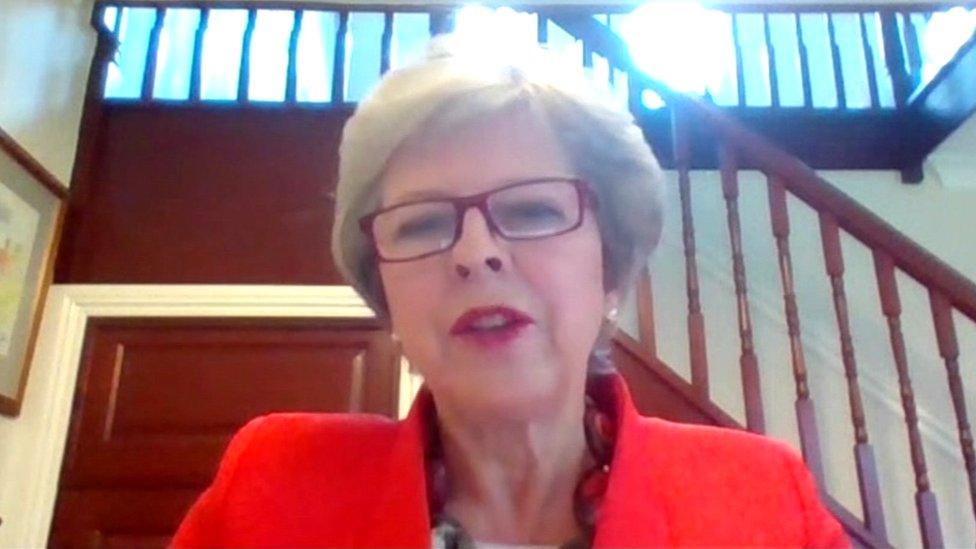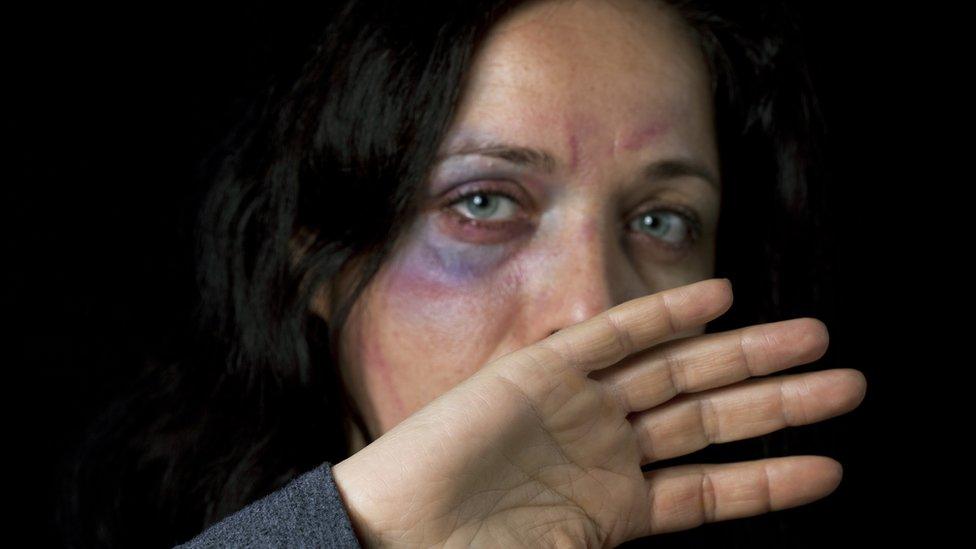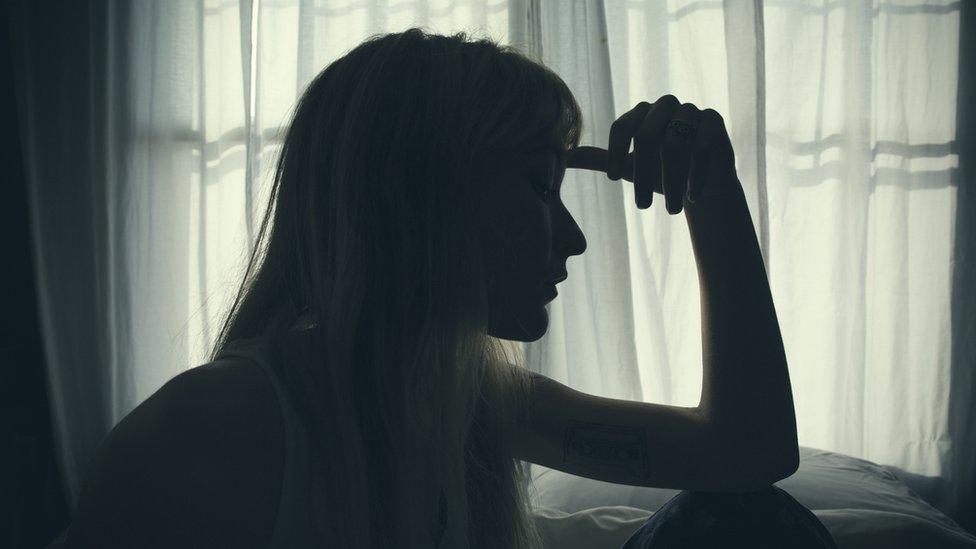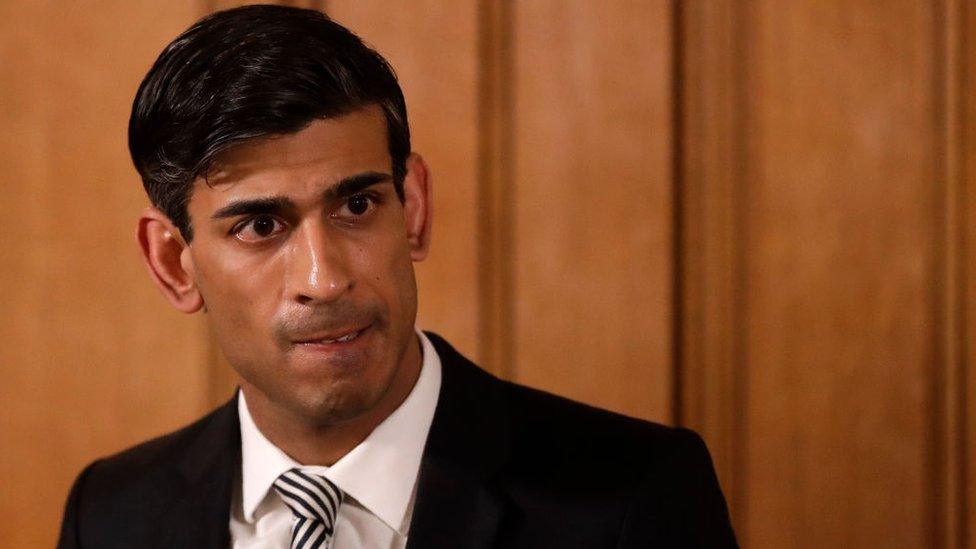Coronavirus: Lockdown exit must take domestic abuse rise into account - May
- Published

The government must consider the impact of the lockdown on domestic abuse and mental health as it plans its exit strategy, Theresa May has said.
The former prime minister said measures to tackle coronavirus must not do "more damage than the disease itself".
She spoke as MPs debated the Domestic Abuse Bill, amid evidence of rising violence during the lockdown.
Justice Secretary Robert Buckland said help would be available for all such victims during the outbreak.
There has been a "surge" in violence in the weeks since the lockdown was introduced, a report by MPs said, with a rise in killings and the number of calls to the National Domestic Abuse helpline run by Refuge up 49% after three weeks.
Addressing MPs via video link, Mrs May said the government must think about the "impact of lockdown on our overall health and wellbeing".
She said police and local authorities should consider random visits to homes of known domestic abuse perpetrators during lockdown, or addresses where there had been reports of violence.
But added that would have to be done carefully, so as not to make the situation worse.
Mrs May's government introduced the Domestic Abuse Bill last July, but it has been postponed since before the general election.
It brings in new protections for victims - including Domestic Abuse Protection Orders and Protection Notices, which can be used to impose long-term bans on perpetrators making contact with the victim.
It applies to England and Wales and proposes the first government definition of domestic abuse, including financial abuse and controlling and manipulative non-physical behaviour.
The Northern Ireland Assembly also debated legislation to strengthen domestic abuse laws on Tuesday.
Mr Buckland told MPs the Domestic Violence Bill aimed to raise awareness of the crime, to protect and support victims and their children, to "transform" the response in the justice system and to "improve performance across all national and local agencies".


The government has always stressed that its Domestic Abuse Bill is proof of its determination to tackle a problem that has been described as an epidemic in the UK.
The bill - drafted before the lockdown - creates a statutory definition of domestic abuse, emphasising it's not just physical: it can also involve coercive or controlling behaviour and financial constraints.
These provisions go to the heart of what could now be happening in homes up and down the country.
Domestic abuse charities have seen a huge increase in calls and online requests for help during the lockdown.
Victims are suffering both physically and emotionally in homes that are not places of safety. Many of the traditional escape routes have been cut off.
A pandemic on top of an epidemic, as one victim described it.

Labour has proposed amendments that would see 10% of the £750 million charity support package announced this month ring-fenced in a fast-track fund for domestic abuse charities.
MPs also said the bill must do more to protect victims regardless of their immigration status, and to ensure that there is adequate accommodation across the board for victims who flee their homes.
As a short-term measure during the lockdown, former shadow home secretary Diane Abbott called on the government to house them in vacant hotel rooms until decent alternatives could be found.
"We know that some hotel chains have offered to help with providing accommodation. These hotels should be taken up on that offer," she said.
Amendments that MPs proposed to table included putting a stop to a defence of "rough sex gone wrong" in court.
Conservative MP Mark Garnier's constituent Natalie Connolly died in 2016 after sustaining more than 40 separate injuries - but her boyfriend was cleared of murder in 2018 on the basis of such a defence.
"How can it possibly be the case that somebody dies through sex?" Mr Garnier asked the Commons. "It doesn't make any sense, this is wrong."

A SIMPLE GUIDE: How do I protect myself?
AVOIDING CONTACT: The rules on self-isolation and exercise
IMMUNITY: Can you catch the virus twice?
HOPE AND LOSS: Your coronavirus stories
LOOK-UP TOOL: Check cases in your area

Charities, too, have called for the Domestic Abuse Bill to offer more support for victims.
Its measures include requiring councils in England to provide support for victims and their children in refuges and other safe accommodation.
However, Barnardo's chief executive Javed Khan said this must be broadened out.
"With the majority of victims remaining in the family home, especially in BAME communities, it's vital that Parliament extends this duty to cover all victims and children - no matter where they live," he said.
There are also calls for a new offence of "non-fatal strangulation" to be included, and for authorities to start collecting data on domestic abuse among the over-74s.
Earlier, the government announced it would spend £3.1 million on services supporting children who witness "appalling abuse" at home during the coronavirus lockdown.
The funding will be given to councils, charities, and police and crime commissioners in England and Wales, and will go towards services such as counselling sessions and early intervention schemes, the Home Office said.
But shadow home secretary Nick Thomas-Symonds said the amount "falls woefully short" of what is needed to "support vital frontline services".
Earlier, safeguarding minister Victoria Atkins told the BBC ministers were working with refuge providers to mitigate the impact of Covid-19 on the availability of places.
"I would also like for us to be looking at perhaps kicking the perpetrator out, rather than the victim, so that she stays in her home safely... and the perpetrator has his behaviour addressed to stop this cycle of abuse," she said.
The Domestic Abuse Bill would also focus on "stopping the perpetrator's behaviour in the first place", she said.
"You will not be breaking coronavirus regulations and you will not be breaking the law if you seek help outside."
Speaking in the Commons before the debate, Attorney General Suella Braverman stressed that victims will not be breaking the law if they need to seek help outside the home during lockdown.
She told MPs: "I want to take this opportunity to let victims out there, both men and women, know that they don't have to suffer in silence."
For more information on organisations that can help if you are experiencing domestic abuse, visit BBC Action Line.
- Published27 April 2020

- Published11 April 2020

- Published8 April 2020
